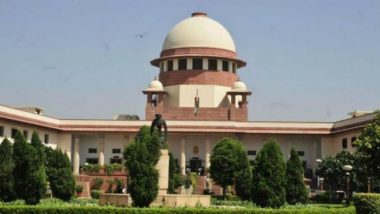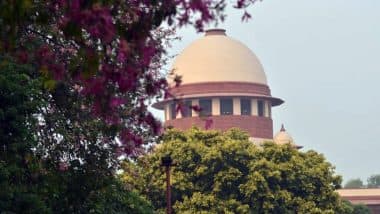New Delhi, March 17: The Centre in a preliminary affidavit point-by-point responded to the criticism against the Citizenship Amendment Act (CAA) and said India is constitutionally secular, and also told the Supreme Court that the CAA does not violate any fundamental right provisions of the constitution and therefore, the question of violation of constitutional morality does not arise.
The amended law seeks to grant citizenship to non-Muslim migrants belonging to the Hindu, Sikh, Buddhist, Christian, Jain and Parsi communities who came to the country from Pakistan, Bangladesh and Afghanistan on or before December 31, 2014. Coronavirus Outbreak: Arvind Kejriwal Urges Anti-CAA Protesters at Shaheen Bagh to Call Off Demonstration as Delhi Govt Bans Gatherings of Over 50 People.
The Centre insisted unlike the particular neighbouring countries, "India is a constitutionally secular country and further has a large population of persons belonging to the classified communities already residing as Indian citizens".
The Centre said after considering the totality of factors, including factors of international geopolitics, the demographic profile of nations surrounding the particular neighbouring countries, the situation of or the presence of other persons of classified communities in other nations surrounding the neighbouring classified countries and the presence of state religions/theocratic regimes in other countries surrounding the neighbouring classified countries, "makes it amply clear that India represents the sole rational and logically feasible place to seek shelter for the said communities."
The Centre in the affidavit said, "It is submitted that constitutional morality is not an unruly horse and cannot become an independent basis for challenging the constitutionality of validly enacted legislations."
The Centre in the affidavit said that the CAA, 2019 does not confer any arbitrary or unguided powers upon the executive. "Under Section 6B(1) the Central Government or a specified authority would grant citizenship only in a manner where certain conditions & restrictions would be satisfied by the applicant. Appropriate rules under Section 6B are being framed to clearly lay down these conditions, restrictions and manner of grant of citizenship", said the affidavit. CAA Row: Supreme Court Refuses to Stay Citizenship Amendment Act And NPR For Now, Issues Notice to Centre.
Addressing the issue of citizenship for Rohingyas, the Centre said that thousands of Rohingyas have come into India mainly through Bangladesh in search of better economic opportunities. "It is submitted that the Rohingyas are not on the same footing as the religiously persecuted minorities who have fled into India from the particular neighbouring countries", said the Centre.
(The above story first appeared on LatestLY on Mar 17, 2020 03:10 PM IST. For more news and updates on politics, world, sports, entertainment and lifestyle, log on to our website latestly.com).













 Quickly
Quickly



















